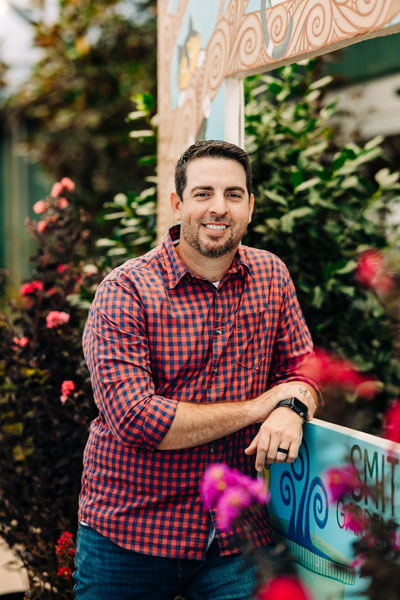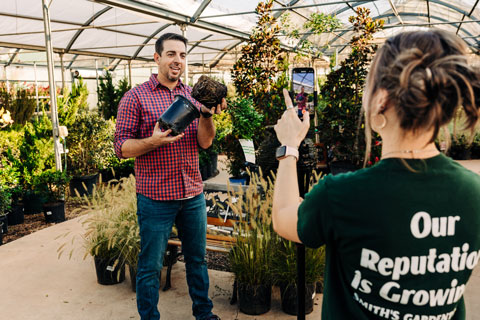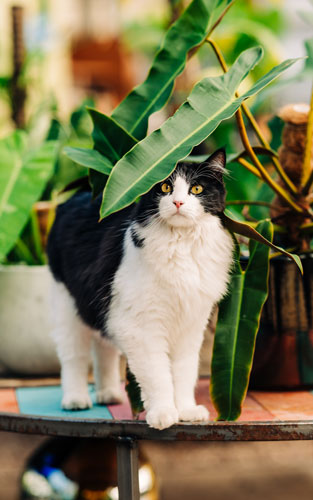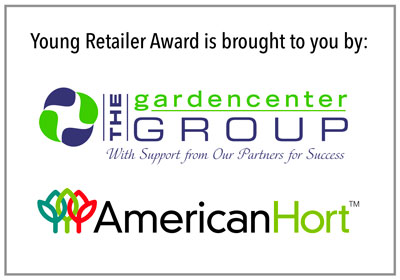9/1/2023
Finding Balance
Jennifer Polanz

It's a brutally hot July day in Wichita Falls, Texas (the mercury peaked at 107), when Michael Fiore’s face pops up on my Zoom screen, at times accompanied by one of the garden center cats. Michael, vice president of Smith’s Gardentown, is this year’s Green Profit/The Garden Center Group Young Retailer Award winner, and boy does he already have some stories.
It’s starting to slow down now at the business, as they head into one of their two slowest months, August. But the challenge of August was blunted by a banner spring, one that was on par with their best year in business in 2021. Our conversation meandered through his time at Smith’s and their accomplishments, as well as his own personal story and how he made his way back into the business. Let’s start there.
“I actually ran away from the business …”
Michael is a “Smith” of Smith’s Gardentown on his mother, Katherine’s, side. He’s the fourth generation in the business, which will celebrate a monumental 75th anniversary next year. The nursery part started in his great-grandfather’s backyard and grew to include a small store. The store relocated eventually to across from the mall in town, a spot that drew the attention of Best Buy in the 2000s. That location was sold and the store relocated to the same land as the growing facility, consolidating everything into one 26-acre grower-retailer operation.
“I actually ran away from the business for 10 years,” Michael said. “I left and then came back. Interestingly enough, when I was a kid, it was owned by my mom and my two uncles. All three of them were equal parts owners and all three of them had three kids.
“There were nine of us in my generation and we all worked in the nursery, and our parents were owners. All nine of us ended up leaving.”
Michael went to Texas A&M University to study wildlife and fisheries, hoping for a career as a game warden or fish biologist. He did still take several horticulture classes because of his continued interest in plants.
“After I graduated from A&M, I didn’t want to jump into a career just yet, so I decided to go off to Latin America,” he said, explaining he wanted to learn Spanish and travel. “I wanted to have a bit of a leap year … well, the leap year turned into almost five years.”
He started in Costa Rica and landed in Peru, expecting to stay for about six months in each, working as an addiction counselor.
“I ended up really enjoying the work and I also met a girl,” he said. “We got married in Peru and we had our first kid in Peru. We were planning on staying and living in Peru long term, but the organization that we were working for ended up falling apart.”
Weeks Away From Bankruptcy
 Meanwhile, back in Wichita Falls, the news was dire. Texas and Oklahoma had been experiencing five years of historic drought, cumulating in extreme water restrictions.
Meanwhile, back in Wichita Falls, the news was dire. Texas and Oklahoma had been experiencing five years of historic drought, cumulating in extreme water restrictions.
“Our city in particular was completely running out of water. That’s not a good thing for a nursery business,” Michael said simply. “It went from Stage 1 to 2 to Stage 4 drought restrictions in our city. In Stage 4 drought restrictions, no one can water any plants at all. You can’t even hand water a pot on your porch.”
Pictured: Michael is the fourth generation of the Smith family in the business. His mother, Katherine, is third generation. Founder C.O. Smith Sr. started the business in his backyard in 1949.
There were some exemptions for businesses and the nursery could water from a pond system, but with no one buying plants they were a couple of weeks from permanent bankruptcy and closure. Michael and his wife, Rosa, didn’t know what to do. Do they try to find something new in Peru? Do they go to Wichita Falls to help the family? At that point, the nursery had gone from a staff of 25 to two—could they even help?
“It was very dire. We sat down and I prayed that night with my wife—what do we need to do?” he recalled. “Do we stay in Peru, do we go to the United States? What do we do?
“The very next day it started raining in Texas. It kept raining and it kept raining.”
It’s true. May 2015 was the wettest month on record at that point for both Wichita Falls and Texas as a state. Historic flooding followed the rains, refilling the lakes in a matter of months—something experts predicted would take years with average rainfall.
The message was clear. “At that point all these people had lost their landscapes because they couldn’t water their plants, so all of the sudden the nursery business was booming,” he said. “When I called [home] again they were like, ‘How fast can you get here?’ because they needed help.”
A New Path
The job coming back was vastly different than the one he’d left all those years ago. Before, it was labor. Working in the nursery, loading cars, moving heavy stuff and sweating. Now, it was working with people, something Michael thoroughly enjoys, and it sent him on a mission to learn as much as he could to answer customer questions. “I was really highly motivated to not look dumb,” he said.
 Pictured: Felicia Garza, social media manager at Smith’s Gardentown, records Michael Fiore for a social media video.
Pictured: Felicia Garza, social media manager at Smith’s Gardentown, records Michael Fiore for a social media video.
That quest for knowledge and enjoyment of interacting with customers now leads customers to ask for him and coming in when they know he’s there. It goes along with his interest in teaching others, which comes through in the store’s social media work.
They started on Facebook, and he laughed, recalling how excited they were to have 5,000 followers. Today, they have 50,000, but that’s nothing compared to the TikTok following.
“About two years ago, as the TikTok phenomenon was sweeping the country—or the world, I guess—I heard a stat that there was more video being watched on TikTok than on YouTube. That blew my mind and I was like, ‘Why are we not on TikTok?’”
They are now, with the help of Felicia Garza, a customer and stay-at-home-mom who had a successful TikTok gardening page at the time.
“She was already creating gardening TikToks, and she obviously knew way more about the app than I did, so I just approached her and said, ‘Hey, would you like to make money making TikToks?’”
She did and they did. She started out part time creating content, but now she’s full time working a hybrid schedule filming in the garden center, editing and posting videos on multiple social media sites and answering messages.
“We brought it in-house, which I always recommend to every garden center. Don’t hire some outside firm to create content for you. You need to bring that in-house because it’s going to be a lot better price and it’s a lot more connected to the business.”
Michael added, too, that it looks like he’s always filming video and spends a ton of time on social media, but thanks to Felicia, he really doesn’t. He spends about three to five hours a week filming videos that get spread out over the week for a daily presence.
It can be a strange phenomenon, too, as it leads to more people knowing about the business than ever before. With more than 100,000 followers on TikTok, the store gets customers from unlikely places, including Wisconsin, but also slightly closer locales of Oklahoma, Arkansas and way south Texas (for comparison, it’s about a 5.5 hour drive from Houston).
Giving Back: Smith’s Cares
One of Michael’s overarching goals is to give back, first within the business, then extending that to the community and eventually (hopefully) the world. The Smith’s Cares idea came about last year as an internal employee relief fund.
“For the whole history of our company we’ve struggled with this: what do you do when someone gets in a financial bind or when they come ask for a loan or a payday advance or something like that,” he said. “You can get into some really uncomfortable situations there.”
The Smith’s Cares Fund is set aside in a separate bank account for employees. A committee of trusted employees (voted on by the employees) vet requests that are filled out on forms that are found in the break room. The requests go to the committee and they either approve, deny or approve part of it. Michael stressed it’s a gift, not a loan.
“Last year, we had six or seven people apply and get money from that, and this year we’ve had another seven or eight people so far get money from it,” he said. “But it lets people know that they are part of the family, part of the Smith’s family, and we want to help take care of them. It really helps with our employee retention here.”
Growing the Business
All of those initiatives we talked about take money to make happen, so how will they make more money? They’re looking to tweak the product mix to keep up with the demand from customers, for one. Annuals have always been their biggest seller, but perennials are getting increasingly popular. Next year, they’re adding on another 20,000 sq. ft. of perennial growing space to increase production.
Their product mix also includes a stone yard they purchased about five years ago that’s continually growing. They’re becoming a combined landscape supply and nursery retail location, with lots of local landscapers purchasing all their material there. They offer everything from sand and gravel to bulk materials of compost, topsoil and fill dirt, as well as palletized rock like river cobble, flagstone and chopped stone.

Work-Life & Taking Back the Message
Two other topics Michael and I spent some time on are work-life balance and what he’d like to see from the industry in the future. Work-life balance is especially important to him, as he watched his mother’s generation, and those before them, spend most of their lives working seven days a week during the busiest times of the year (a habit that would bleed over into not-so-busy times, too). There was a culture of guilt over taking days off and Michael is pushing against that, for himself and his employees.
“It seems to be really widespread in our industry of this whole never take a day off-type deal and your whole identity is mixed into the business,” he said. “That’s something that I’ve had to be really intentional about and say no. I’m going to take a day off, I’m going to take a vacation, I’m going to take time to go to their dance recitals and their games, or whatever it is.”
Pictured: Smith’s Gardentown often features their garden center cats, including Sylvester (pictured here), in their social media posts, which their customers love.
As Michael considers the future with the business as a father of three young kids (9, 6 and 3), that work-life balance becomes vital.
“As I move into ownership that’s one of the big things I want to change in the culture,” he added. “The business is not your life. You should have a life outside your business—this is your job. Your job doesn’t have to be your life.”
 I asked him, too, what he’d like to see more of from our industry as a whole and his answer was all about taking back our messaging. He noted that during the pandemic (or even before it really), there was a lack of gardening content online that got filled by social media influencers. Some were knowledgeable, but others simply had a few plants, a camera and a following.
I asked him, too, what he’d like to see more of from our industry as a whole and his answer was all about taking back our messaging. He noted that during the pandemic (or even before it really), there was a lack of gardening content online that got filled by social media influencers. Some were knowledgeable, but others simply had a few plants, a camera and a following.
“In the future, I want us to be the ones that are going to drive the trends and be able to push the market where it needs to go. That’s one of the main reasons why I want to create content and I want other nurseries to do it, too,” he said.
“I think that’s going to help shine a light on our industry and (give) a different perspective on our industry when it comes to Gen Zs.
“If they can see that side of it and see people that are actually doing it professionally and having a good time, I think it will be more appealing to draw them into the industry.”
About Smith’s Gardentown
Location: Wichita Falls, Texas
Size: 26 acres; 4 acres of greenhouse space split between retail and production
Sales: $4.5 million (2022)
Employees: 38 employees, about half are part time
What They’re Known For: Size and selection of healthy plants, and helpful, knowledgeable people
Top 5 Retail Categories:
1. Bedding plants
2. Trees/shrubs
3. sod
4. stone yard
5. hardgoods
Website: smithsgardentown.com
GO HERE to view the Smith’s Gardentown TikTok page with 139,000 followers. GP